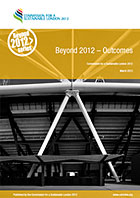Official statement from the Commission for a Sustainable London 2012 relating to the stadium bid process
The Commission for a Sustainable London 2012 is the independent body established to assure and monitor the sustainability of the London 2012 Games. As such, our role includes the task of ensuring that the promises made in the original bid document to stage “the greenest Games ever” are upheld across all aspects of the London Olympics. This includes monitoring what happens to the stadium after the Games period ends. Although it is not within our remit to comment on individual stadium bids, we do have three clear and fundamental criteria for a sustainable stadium legacy. These are:
1. Community
The bid promised a multi-sport facility in legacy and this is backed up by the legal conditions set by the BOA with regard to the rights to use the word “Olympic” in the title of the park. The bid book promised that “the Olympic Stadium will be converted to a 25,000 seat multi-purpose venue with athletics at its core”.
From what we know of the two bids, we believe the Tottenham option will find this condition challenging. Although their plan to refurbish Crystal Palace may go some way to satisfying the letter of the commitment, we believe it falls short of the spirit of this promise.
2. Environment
We expect the OPLC to operate to the highest standards of environmental sustainability, using the ODA’s performance to date as a benchmark. Both bids will involve substantial re-work of the facility. By its nature, construction is profligate in its use of energy, raw materials and waste. We have expressed concern in the past that 67% of the Games’ carbon footprint is embodied in construction and would not wish this to be exacerbated. Furthermore, planning requirements specify high standards of environmental sustainability including a BREEAM Excellent rating for venues. The winning partner would have to achieve this.
We believe that re-working an existing facility almost always has a lower environmental impact than building a new one.
3. Biodiversity
East London was promised a park. To quote the bid book, “the Olympic Park and its eventual extension to the Thames will create the largest new urban parkland in Europe”. This translates into a promise to provide 102 hectares of open space and 45 hectares of high-quality habitat in the Olympic Park.
Given that both bids involve a larger-than-planned stadium, maintaining this promise will be challenging for the OPLC in both scenarios.
In summary, we have discussed these issues recently with the OPLC and made it clear that these considerations need to be taken into account in all their commercial dealings with potential partners, not just regarding the stadium. We look forward to working with the successful partner to make sure the letter and spirit of the sustainability commitments in the Olympic bid are continued into legacy.
